The latest DLC for Paradox Development Studios’ WW2 grand strategy title is very ambitious. The accompanying patch, available to all, shakes things up quite a bit and I’ve had a chance to play around with it all before launch.
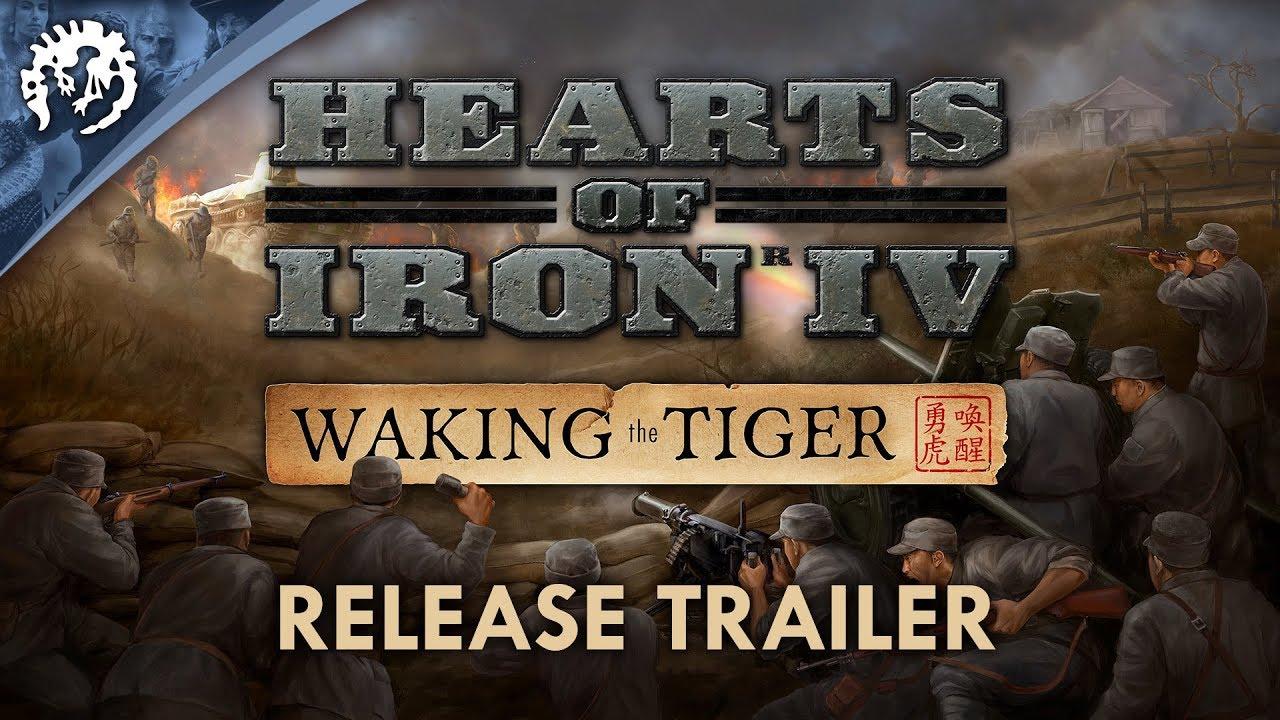
Direct Link
Note: Review copy provided by developer
For those of you who aren’t grizzled armchair generals, veterans of countless virtual wars, Hearts of Iron IV is a sandbox-y strategy game set in the years around the Second World War. You’re able to take control of any nation that existed in the time period and manage industry and military in order to survive this conflict. It’s fair to say that it’s a game that values plausibility and historical flexibility over complete fidelity and Waking the Tiger expands on that dynamism considerably.
If you’re coming back to the game after a while, the 1.5 “Cornflakes” update that’s released today makes a few fundamental changes to the experience. Most notable is the new decisions system. All nations now can trigger these under certain conditions paying a certain cost. They can be something like allowing women into the workforce if your war support is high enough and your economic mobilization is high enough or triggering special military operations that give your units a bonus for a short amount of time. Most of these decisions are available as part of the patch, though some are specific to some nations otherwise covered by the DLC. It’s something that works well and goes a long way in providing flavor and player agency.
Many of these decisions are dependent on conditions like your general stability and war support, metrics that have also been introduced with this patch. Events, decisions, ministers and leaders, national focuses, and actual war can modify the value for both. You’ll get either bonuses or penalties to your nation and its capacity depending if the levels are high or low. It’s certainly something that you have to watch out for and I found in one of my games that having my manpower mobilized too high without enough war support during peacetime triggered a nasty modifier. In another, low stability triggered strikes and a small event chain where I could try to end the discontent by either using propaganda or sending in the troops (with varying degrees of probability of it backfiring). These are nice touches and a definite improvement from the old and unengaging national unity system.
It should also be mentioned that unit commanders have gotten a reworking. Generals and field marshals now tend to have traits like “politically connected” that modify their experience gain and abilities. There are separate values for skills like attack and defense now as well and a rudimentary chain of command. Armies can now be joined in groups led by a field marshal, which gives slight bonuses depending on the marshal’s skill and traits. If you haven’t got the DLC traits will work as before, gaining them through combat, but otherwise you can now also specialize your leaders whenever they gain a trait. So an infantry leader can choose to specialize between becoming an ambusher or granting a small bonus to attack, for example. It’s a straightforward system that lets you customize your leaders but I can’t really say that it adds that much to the game. That may just be because it can still be a little too slow to get traits through combat unless you’re constantly engaged with the enemy in battles of attrition.
Speaking of battles, there’s a few changes regarding troops as well. Special forces are now limited to a percentage of total troops and there’s new techs that can be researched to modify their capacity. Forced retreats are also distinct from withdrawals, meaning that it’ll be easier to avoid getting overrun if you disengage in an orderly fashion. Temperature now plays a bigger role as well and troops get acclimatized to either heat or cold depending on where they are and it affects their performance in combat. So yes, your Afrika Corps or Desert Rats won’t be as effective until they get used to the scorching North African weather.
There’s quite a few quality-of-life improvements as well that make for refreshing change. Managing production is easier now as lines can now be dragged and dropped around and you can set the amount of factories working on something by groups of 5s or 10s. There’s new interfaces for both wars and factions as well as keeping track of naval losses. Given the amount of information that players are expected to process, these seemingly small things end up making a big impact on games. I couldn’t imagine playing without these improvements now. Nor could I imagine playing without the historical name list for division types, which does a good job at adding immersion.
So far, I’ve talked about the free stuff that’s in the patch. It goes to show just how much has changed, by and large for the better. While the game hasn’t changed fundamentally like with Stellaris and it's recent big patch, I’m impressed at just how much continues to be polished and refined with Hearts of Iron IV. You can see the full patch notes here and see for yourself the full scope of the changes.
Turning to the actual paid features of Waking the Tiger, there’s a fair amount to unpack. The main thematic focus is in the Chinese Front of the war and, as you would expect, the various Chinese warlords and the Japanese have gotten most of the attention. There’s unique focus trees, decisions and mechanics for nearly everyone there. The Japanese focus tree has also been reworked (basic on in the patch for free, alt-history branches are paid content) and I have to say that it was a much needed overhaul. Every nation there is fun to play.
All the Chinese factions have a part of their focus tree in common, modeling their attempts to get foreign powers to intervene on their behalf over the years. Some of these focuses are tied to realities on the ground, such as controlling the Burma Road, which allows aid to come from the British so long as the Japanese don’t cut it off. Eventually this section of the focus tree culminates in plans for a united China and the objectives of the newly reforged nation.
What I appreciate the most about the new national focuses is how flexible they allow the player to be. The Nationalists and Communists can play around with how they approach the matter of the civil war. For example, as Communist China, you can end the historical power struggle among the leadership in different ways with different political consequences. So by ditching Mao you can try to outright join the Comintern or try for a rapprochement with the nationalists by adopting social democracy. I won’t spoil some of the event chains and the various outcomes but things can get quite messy, quite fast but it's all in good fun.
Some of the new decisions play up to this dynamism. The communists can infiltrate states with increasing levels of partisans which, when built up, can spawn troops during uprisings. Other powers can spend political power to counter and neutralize these rebels. And some, like the Japanese puppet state of Manchukuo, have to contend with bandits and must spend the resources via decisions to hunt them down in their various states.
Border clashes between these factions are also possible and you’re able to keep escalating the conflict until outright war if one side doesn’t back down. While the majority of decisions are interesting, I have to criticize this last mechanic. In the early stages, the game automatically takes a bunch of your troops to attack a border province. Problem is that there’s no control over when they attack and from where, making the clashes seem like they’re down to luck at times. More than once I felt frustrated that they were attacking a mountainous province by a river that’s garrisoned heavily instead of the relatively empty one right next to it. Short of escalating into war and returning the troops to my control, there was nothing I could do.
Outside of Asia, the Germans have also gotten a special new focus tree that can potentially see the country plunged into a civil war as the army attempts to depose the Nazis. The outcome can lead to either a democratic Germany or the restoration of the monarchy. The latter can lead to the restoration of monarchies elsewhere as the Kaiser settles old scores. It’s a well done series of events and focuses but not exactly something that I could see myself doing more than once every blue moon. The core reason is that the dynamics of Germany are still more or less unchanged. There will still be, more likely than not, a reckoning with France/Britain and then the Soviet Union. Regaining lost German colonies after the war doesn’t really matter when the bulk of the game is about fighting that war. Still, as Germany is a popular nation to play, I think this variation will still appeal to a lot of people.
The other features of the DLC are all nice but they’re not exactly headliners. Things like new art, unit models, sound effects and music are all great and add to the atmosphere. Minor mechanics like capturing equipment from battle and sending planes as volunteer forces are likewise nice to have. Being able to prioritize strategic targets during bombing is something that can have an impact given the (free in patch) rework of infrastructure and resource gain but it’s also not a game-changer.
The conflict in China has easily provided some of my most memorable moments with Hearts of Iron IV, overall. The density of provinces and the variety of terrain gives factions strategic flexibility in their approach to the fighting. It makes the composition of your units and armies feel important in a way that isn’t always achieved for the war elsewhere in the world. In my last game before writing this review, I played as an assertive Manchukuo that broke free of their Japanese overlords and was well on its way to restoring Qing China and reclaiming the Mandate of Heaven. I even managed peace with Japan after kicking them off the mainland. Eventually, the Soviet Union intervened on behalf of the struggling communists, no doubt not being able to abide an emperor ruling China, and threatened to overwhelm me completely. It was a wild and fun ride full of twists and turns.
As wonderful as all that was, there are still a few problems that remain in the base game. For one, the AI still isn’t that good with dealing with multiple fronts and in some of my games I saw Germany get crushed by an aggressive, expansionist Poland and other neighbors. The Soviets also seemed to have a hard time whenever they fought Germany or the Polish coalition that sometimes formed, grinding down their army with unceasing attacks in low infrastructure areas before finally collapsing in the eventual counterattacks. I’ll admit that I didn’t play enough games for this to be statistically significant, let alone ones where the historical focuses were left on, but things seemed off enough that it might seriously bother me if my games continue to play out in the same fashion.
Other than that, because of all the changes and improvements to major powers like Japan, Germany and the UK commonwealth in this expansion and previous ones, the deficiencies of other majors have become more glaring. The focus trees for France, the USA, Italy and the Soviet Union feel particularly underwhelming in comparison. The game is a victim of its own success in that regard. These powers have gotten their own decisions, too, but it’s still not enough to make up for the game in depth and quality other nations have gotten since release.
Still, given the excellent work PDS have put into this patch and DLC, the future looks bright. I expect modders will go wild with the new decision mechanics and we’ll be getting plenty of fun and creative takes before too long. I’m personally looking forward to how the excellent Kaiserreich mod will implement these as it’s been hinted that they’ve been given advanced access to the patch for a few weeks now.
You can grab Waking the Tiger through the Paradox shop or Steam.
It’s a straightforward system that lets you customize your leaders but I can’t really say that it adds that much to the game.Ah, the eternal Paradox balancing problem: :)
DLC systems have a small effect on the game:
"Why are you charging this much money for this DLC???"
DlC systems have a large effect on the game:
"Why are you locking this content behind a paywall???"
I'll probably pick this up the next time I get the urge to get back in to HoI IV.
The rebels have factories but by god do they lack supplies.
I ended up cheating just to create a United democratic Germany.
And then the French turned Facist ....
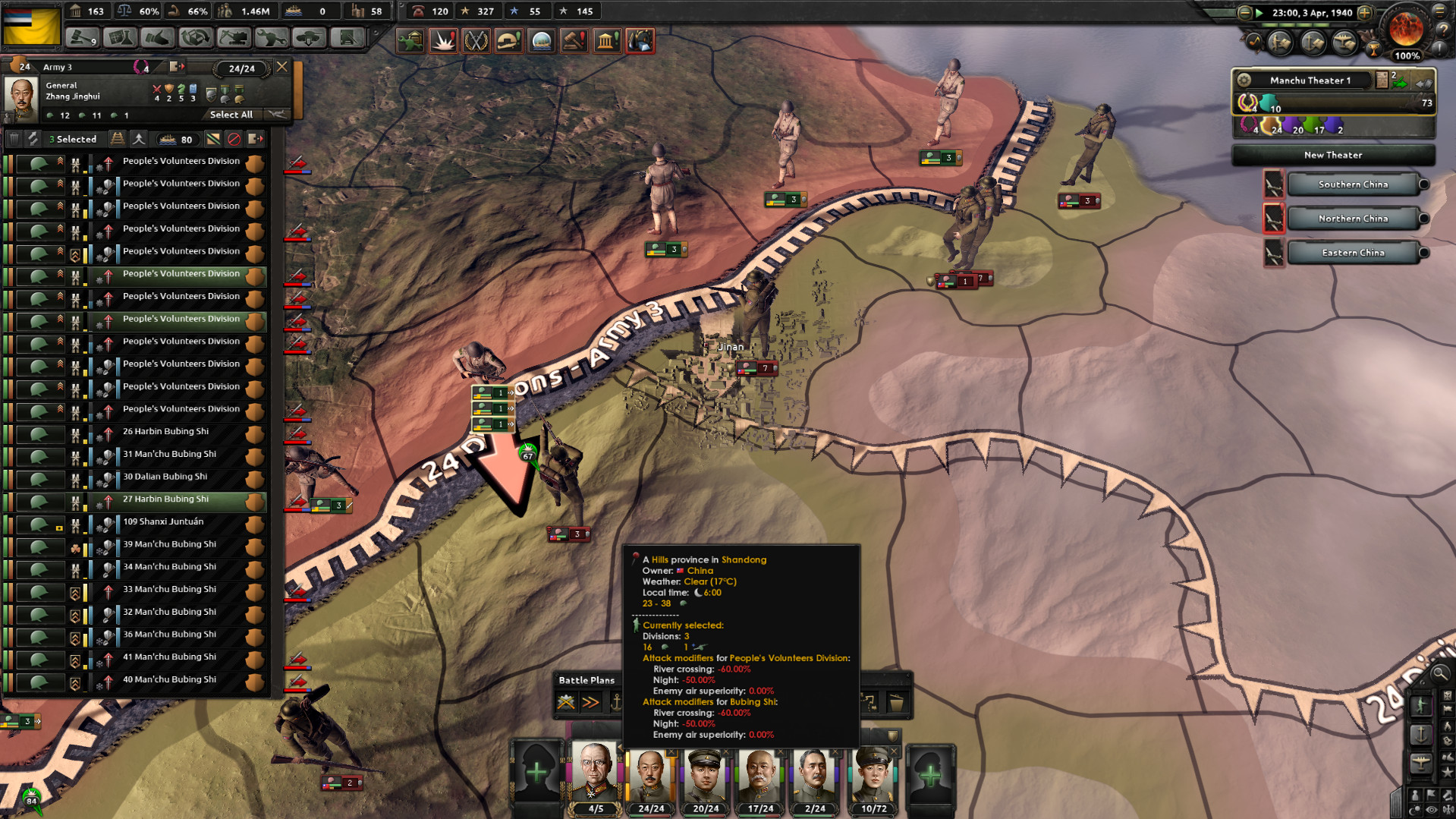
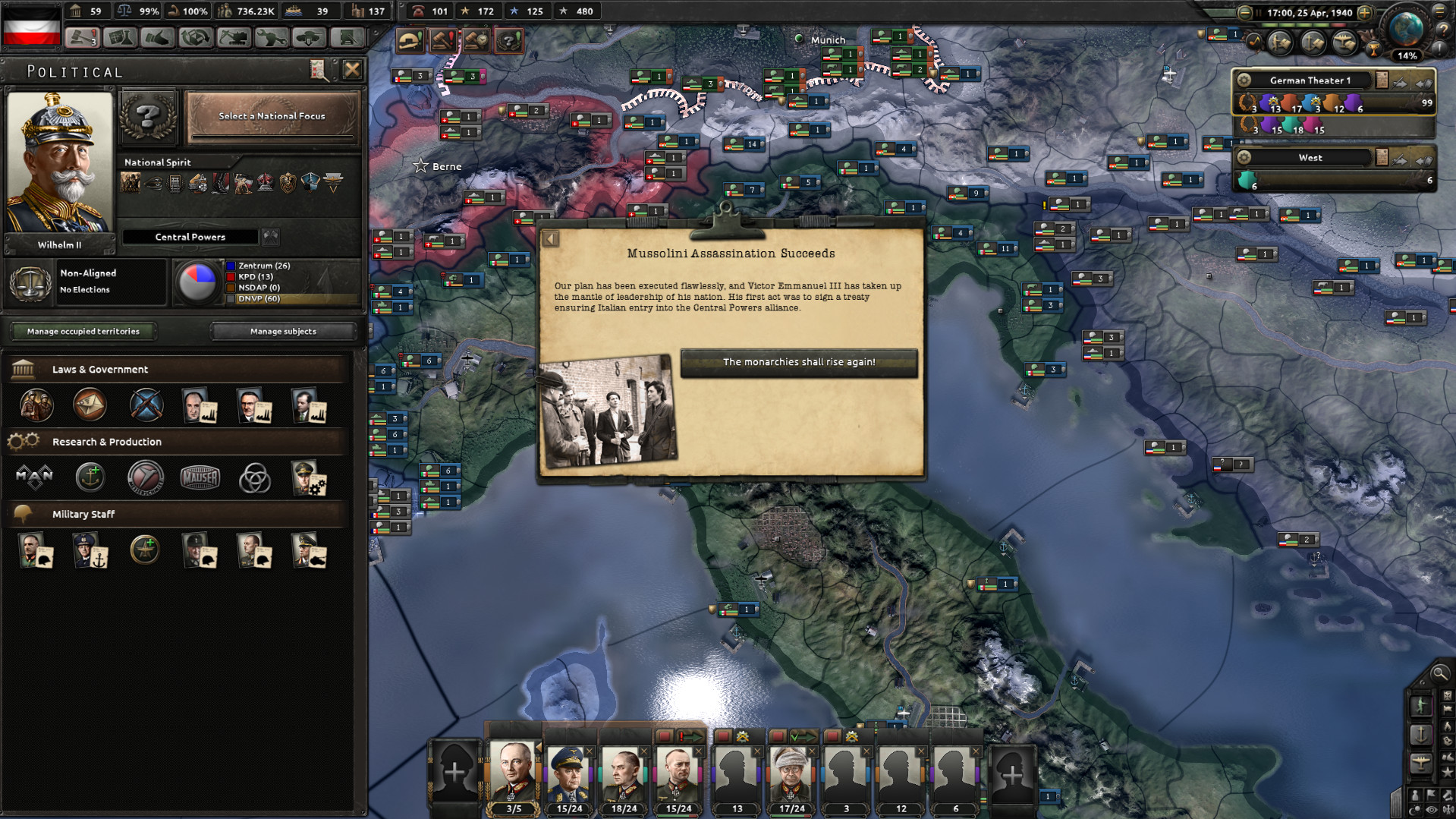
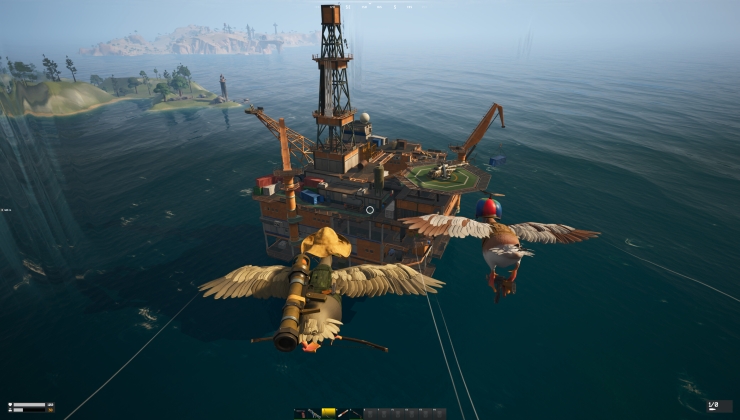
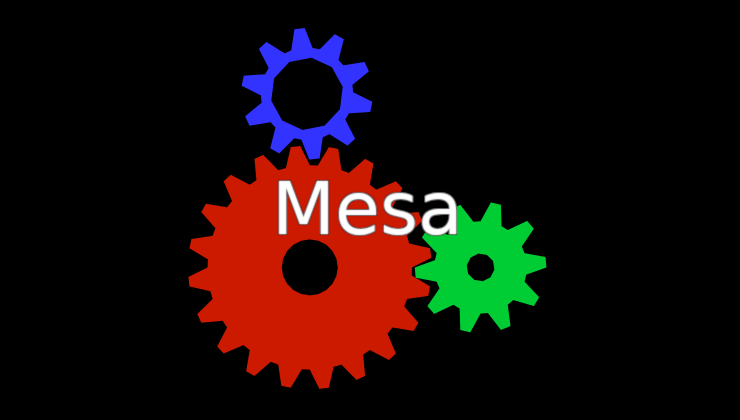

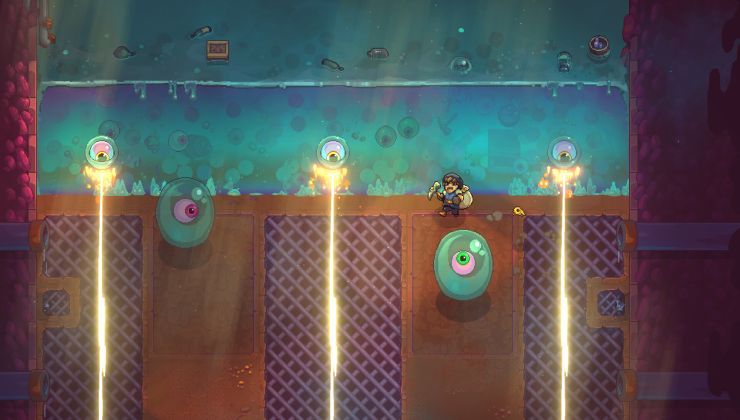


 How to set, change and reset your SteamOS / Steam Deck desktop sudo password
How to set, change and reset your SteamOS / Steam Deck desktop sudo password How to set up Decky Loader on Steam Deck / SteamOS for easy plugins
How to set up Decky Loader on Steam Deck / SteamOS for easy plugins
Oh and the name doesn't mean anything but coincidentally could be pronounced as "Buttery" which suits me just fine.
See more from me